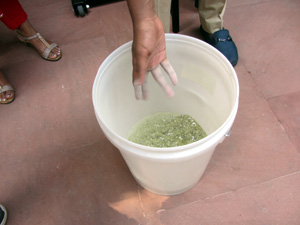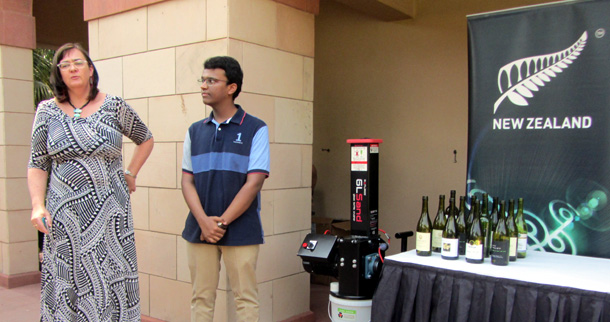Nivedita Khandekar
New Delhi, May 31 : A 17-year-old class XII student from Delhi has started a unique initiative – Glass2Sand – which involves recycling of glass bottles into usable sand. The green initiative has received help from the New Zealand High Commission.
 Udit Singhal, a student of the British School, said the idea to recycle glass into something useful came from the number of bottles lying around at his home. “Earlier, the kabadiwala used to take those and ultimately the bottles ended up at a landfill site. And if we see, the landfills have glass bottles in the thousands, taking up space — a scarce resource — and increasing the burden on the environment as glass is not an easily degradable thing. And now-a-days, even the kabadiwalas / ragpickers are not buying glass bottles,” he said.
Udit Singhal, a student of the British School, said the idea to recycle glass into something useful came from the number of bottles lying around at his home. “Earlier, the kabadiwala used to take those and ultimately the bottles ended up at a landfill site. And if we see, the landfills have glass bottles in the thousands, taking up space — a scarce resource — and increasing the burden on the environment as glass is not an easily degradable thing. And now-a-days, even the kabadiwalas / ragpickers are not buying glass bottles,” he said.
A youngster of many means, Udit searched the internet for possible solutions and came in touch with makers of a machine from New Zealand that completely crushes the glass bottles and converts it into sand without generating any waste or dust.
Udit approached the New Zealand High Commission, which was only too pleased to be involved in the unique green initiative. He purchased the machine, an innovation by Kiwi company Expleco Ltd, which was brought to Delhi with the help of a grant from the New Zealand High Commission.
Of the 8000 tonnes of solid waste collected in Delhi alone, glass accounts for about 80 tonnes. “The machine achieves a 90 % volume reduction of the bottles and takes just under 10 seconds to crush a single bottle. A bottle of beer (330 ml) can yield 263 gm of sand, while a champagne bottle (750 ml) can produce 838 gm of sand. The sand thus produced is safe to be used in brickmaking, construction, road repair, and on beaches and golf bunkers. As the sand produced is the same colour as the bottles, the multi-coloured sand can serve a decorative purpose as well,” he informed.
Over time, as demand grows for the sand, Udit’s intention is to be able to combine the environmental benefits with a social enterprise, paying ragpickers for bottles they provide.
“We are happy to support the Glass2Sand project as it ties in with our focus on sustainability and the environment. This is an efficient, zero-waste solution, benefiting the community in multiple ways,” says New Zealand High Commissioner Joanna Kempkers. The project will not only benefit the environment but in due course also provide ragpickers with a steady income for the glass bottles they bring in.
Udit Singhal has turned entrepreneur at this age and will be the sole distributer for the machine in India, Kempkers said. The machine costs New Zealand dollars 4000 plus import duty and needs no replacement of any parts for up to 20,000 bottles.
The young entrepreneur plans to reach out to various embassies, high commissions, pubs and bars and restaurants that serve liquor, all such places where he can easily get hold of more bottles. He also plans to tie up with rag pickers so that they get an incentive to collect more bottles and rather than dumping them at the landfill site, give it to him for recycling.
The initiative is also a boon for reducing air pollution as the crushed glass turned into sand is collected in vacuum container, which does not allow any particles to escape into atmosphere. The crushed glass sand is also safe for handlers.
———–
Nivedita Khandekar is an independent journalist based in Delhi. She writes on environmental and developmental issues. She can be reached at [email protected] or follow her on twitter at @nivedita_Him

